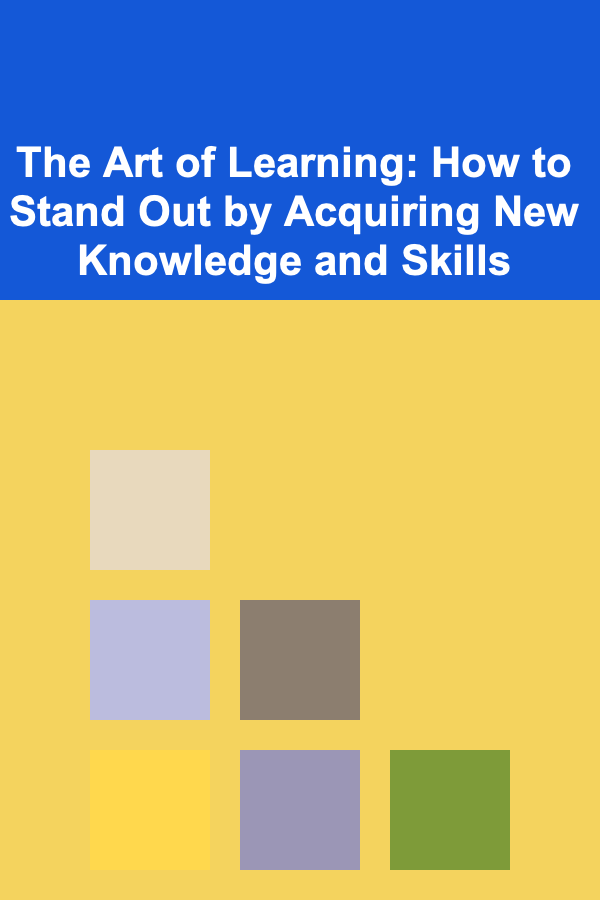
The Art of Learning: How to Stand Out by Acquiring New Knowledge and Skills
ebook include PDF & Audio bundle (Micro Guide)
$12.99$9.99
Limited Time Offer! Order within the next:

In today's fast-paced world, the ability to learn effectively is one of the most valuable skills you can possess. Learning is not just about accumulating facts; it's about developing the mindset, strategies, and habits that allow you to continually improve, adapt, and excel in various areas of life. In a world where the pace of change is ever-increasing, being able to acquire new knowledge and skills quickly can give you a significant competitive edge, both personally and professionally.
This guide explores the art of learning, focusing on practical strategies and insights to help you stand out by mastering new knowledge and skills.
Cultivate a Growth Mindset
The foundation of effective learning starts with your mindset. A growth mindset---the belief that abilities and intelligence can be developed through hard work and dedication---is essential for standing out in any field. When you embrace this mindset, challenges become opportunities for growth, and failures are seen as stepping stones to success.
Actionable Tip:
- Embrace Challenges: Don't shy away from difficult tasks. Instead, view them as chances to stretch your capabilities. Whether it's learning a new language or tackling a complex project, the harder it is, the more valuable the learning experience.
- Celebrate Effort Over Talent: Focus on the process, not just the outcome. Celebrate the effort you put into learning and the progress you make along the way, regardless of immediate results.
Set Clear, Achievable Learning Goals
A key element of standing out through learning is having clear goals. Without specific objectives, learning can feel aimless and overwhelming. Setting clear, measurable goals helps provide structure, motivation, and a sense of purpose. The SMART (Specific, Measurable, Achievable, Relevant, Time-bound) framework is a powerful tool for setting learning goals that are both challenging and realistic.
Actionable Tip:
- Break Down Complex Skills: For example, if you want to learn programming, break it down into smaller, more manageable goals, such as mastering basic syntax, understanding algorithms, and completing a small project.
- Track Your Progress: Use tools like journals, apps, or spreadsheets to monitor your progress and ensure you're staying on track with your learning goals.
Master the Art of Active Learning
Active learning is an approach that encourages deep engagement with the material rather than passively consuming information. This means being actively involved in the learning process through activities like note-taking, teaching others, discussing concepts, and solving problems. Active learning helps you retain information more effectively and develop critical thinking skills.
Actionable Tip:
- Use the Feynman Technique: Teach what you've learned to someone else. If you can explain a concept clearly and simply, it means you've truly understood it.
- Engage in Problem-Solving: Practice applying new knowledge in real-world situations. The more you work with the information, the better you'll internalize it.
Learn How to Learn
Understanding how your brain processes and retains information is crucial for effective learning. Neuroscientific research shows that the way we approach learning significantly impacts how well we can acquire and retain new knowledge. For instance, spaced repetition, the technique of reviewing material at increasing intervals, can enhance long-term retention.
Actionable Tip:
- Use Spaced Repetition: Tools like Anki or Quizlet can help you implement spaced repetition in your learning routine, especially for subjects that require memorization.
- Take Breaks and Sleep Well: Your brain needs rest to consolidate new information. Incorporate short breaks into your study sessions and make sure you're getting enough sleep to enhance memory retention.
Leverage Multiple Learning Methods
Everyone has a preferred learning style, but research suggests that using multiple learning methods can deepen understanding and improve retention. Whether it's through reading, watching videos, taking online courses, or hands-on practice, combining different modes of learning helps reinforce the material and keeps you engaged.
Actionable Tip:
- Diversify Your Learning: Try blending reading with watching instructional videos or podcasts. If you're learning a new language, for example, you could use an app like Duolingo, listen to podcasts in that language, and participate in conversation practice with native speakers.
- Engage with Experts: Learning from experts can provide valuable insights that go beyond textbooks. Seek out mentors, attend webinars, or engage in discussions with experienced professionals to deepen your knowledge.
Develop Consistency and Discipline
The key to acquiring new knowledge and skills is consistency. Knowledge is built incrementally, and daily practice is crucial for mastering any subject. Setting aside time each day, even if it's only 30 minutes, to learn something new or review what you've learned can lead to significant long-term progress.
Actionable Tip:
- Establish a Routine: Dedicate specific time slots in your daily schedule for learning. Treat it as a non-negotiable part of your day, like exercise or eating.
- Use the 80/20 Rule: Focus on the 20% of material that will give you 80% of the results. Prioritize high-impact learning activities that are most relevant to your goals.
Challenge Yourself with Real-World Application
While theoretical knowledge is essential, applying what you've learned to real-world situations is the key to mastering new skills. Challenge yourself by working on projects, solving problems, or participating in activities where you can test your knowledge and abilities. Practical experience reinforces learning and helps you see the relevance of what you've studied.
Actionable Tip:
- Take on Personal Projects: If you're learning a new skill, such as graphic design, apply your knowledge by working on a personal project like designing a website or creating a brand identity for a fictional company.
- Join Communities or Competitions: Participate in online communities or competitions related to the skill you're learning. Engaging with like-minded individuals and challenging yourself against others can accelerate your progress.
Embrace Failure as a Learning Tool
Failure is an inevitable part of learning. Instead of seeing failure as a setback, view it as a valuable part of the process. Each mistake you make offers insights into what doesn't work and gives you the opportunity to adjust your approach. The most successful individuals are often those who have failed the most, because they've learned the most from those experiences.
Actionable Tip:
- Analyze Your Failures: After a setback, take time to reflect on what went wrong. Identify the lessons you can learn and use them to refine your approach next time.
- Keep a Growth Journal: Track your failures and the lessons you learn from them. This journal can be a powerful reminder of how far you've come and the resilience you've developed.
Foster a Lifelong Learning Habit
The most successful people are those who make learning a lifelong habit. Rather than seeing learning as a task that ends after school or a course, view it as an ongoing process that will continue throughout your life. A commitment to lifelong learning allows you to stay adaptable, remain competitive in your field, and continuously improve.
Actionable Tip:
- Read Regularly: Make reading a part of your daily routine. Books, articles, research papers---anything that keeps you informed and exposes you to new ideas.
- Engage with Podcasts and Audiobooks: Use your commute or downtime to absorb new information through podcasts or audiobooks. These are great ways to keep learning when you're on the go.
Seek Feedback and Continuously Improve
Feedback is one of the most powerful tools for growth. Whether it's from mentors, colleagues, or self-assessments, regularly seeking feedback allows you to identify blind spots, refine your skills, and stay on the path of continuous improvement.
Actionable Tip:
- Ask for Constructive Criticism: Actively seek feedback on your performance. Ask others to highlight areas where you can improve and take their advice seriously.
- Self-Assess Regularly: Periodically assess your own progress. What have you mastered? Where do you still need work? This self-reflection will help you adjust your learning strategy as you go.
Conclusion
Mastering the art of learning is not just about acquiring knowledge and skills---it's about developing a mindset that values growth, challenges, and continuous improvement. By setting clear goals, practicing active learning, embracing failure, and consistently applying your knowledge in the real world, you can distinguish yourself as someone who not only adapts but thrives in any environment.
Incorporating these actionable strategies into your learning process will not only help you stand out but also equip you with the tools to become a lifelong learner---always improving, always evolving. The ability to learn, adapt, and grow is the ultimate differentiator in a world that's constantly changing.
Reading More From Our Other Websites
- [Personal Finance Management 101] How to Use Cash-Back Rewards and Loyalty Programs Strategically
- [Personal Care Tips 101] How to Find a Face Oil That's Right for Your Budget
- [Personal Finance Management 101] How to Choose the Right Retirement Account: Roth IRA vs. Traditional IRA Explained
- [Toy Making Tip 101] Friendship in Every Piece: Designing and Assembling Handmade Toys Together
- [Personal Care Tips 101] How to Choose a Deodorant with Organic Ingredients
- [Soap Making Tip 101] Seasonal Soap Recipes: Crafting Nature-Inspired Bars for Every Time of Year
- [Home Rental Property 101] How to Handle Property Damage Claims in a Rental Property
- [Organization Tip 101] How to Incorporate Plants into Your Bathroom Organization
- [Home Party Planning 101] How to Host an Enchanting Winter Party: Planning Guide for Cozy Gatherings
- [Personal Care Tips 101] How to Exfoliate Your Skin Before a Big Event with a Body Scrub

How to Clean and Maintain Your Home's Gutters Effectively
Read More
How to Create a Tool Maintenance Schedule
Read More
How to Use Drawer Dividers for Small Hobby Items
Read More
How to Identify First Editions of Marvel Comics
Read More
10 Tips for Planning Event Videography: Capturing the Energy
Read More
How to Plan Your Music Listening Around Workout Routines
Read MoreOther Products

How to Clean and Maintain Your Home's Gutters Effectively
Read More
How to Create a Tool Maintenance Schedule
Read More
How to Use Drawer Dividers for Small Hobby Items
Read More
How to Identify First Editions of Marvel Comics
Read More
10 Tips for Planning Event Videography: Capturing the Energy
Read More